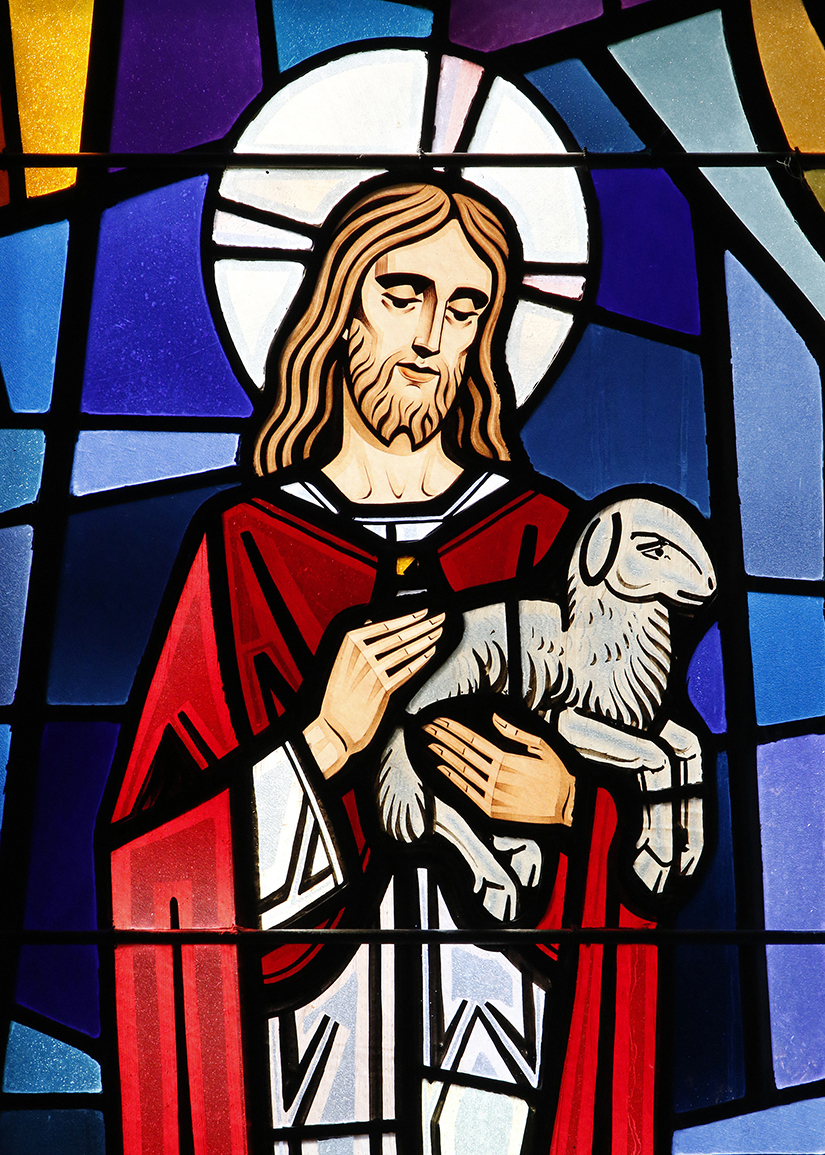 Jesus the Good Shepherd is depicted in a stained-glass window at St. Francis of Assisi Church in Greenlawn, N.Y.Photo Credits: Gregory A. Shemitz | Long Island CatholicWe hear all these beautiful stories about the Good Shepherd and how the shepherd cares for the flock. We are told that the shepherd has our best interests in mind when the shepherd tells us where to rest, what to eat, where we will be safe and who to watch out for. The shepherd is our protector and will even lay his life down for the flock. All this is well and good, but if we are not good at following, it won’t work.
Jesus the Good Shepherd is depicted in a stained-glass window at St. Francis of Assisi Church in Greenlawn, N.Y.Photo Credits: Gregory A. Shemitz | Long Island CatholicWe hear all these beautiful stories about the Good Shepherd and how the shepherd cares for the flock. We are told that the shepherd has our best interests in mind when the shepherd tells us where to rest, what to eat, where we will be safe and who to watch out for. The shepherd is our protector and will even lay his life down for the flock. All this is well and good, but if we are not good at following, it won’t work.
To be honest, most of us like to be in charge. We don’t want anyone telling us what to do or where to go. We might say that we trust God and count on God’s protection, but it is usually qualified with a “but if.” But if I don’t agree or understand where God is leading me, I won’t follow until I understand. I will only follow the shepherd when I think I am lost otherwise I’ll take the lead. Do you recognize that in yourself? I do. It seems to be more prevalent in cultures where life is fairly convenient.
We don’t get much practice at following in trust, because we call our own shots. That’s a fake kind of freedom that leads us to believe that we can do whatever we want and woe to the institution or person who tries to tell us otherwise. We don’t have to practice much dependence and trust when we believe that we are calling all the shots. It makes changes in life difficult because we are unpracticed in it. We revolt, rebel and deny. We belittle and judge, we become bitter and cynical. What might it look like to follow the shepherd and be a follower rather than the one who takes the lead?
He tells us that when we come to the wedding feast, take the lower seat not the higher. This is not just for weddings but for life in general. He tells us to spend time with the hungry, the lonely, the poor, the homeless and the imprisoned. He tells us to respect every human life, without condition. He tells us to love our enemies and to do good to those who hate us. He tells us to voluntarily empty ourselves for the sake of others. He tells us to give out of our need, not out of our surplus. I could go on and on.
As I was typing all those sentences I questioned whether I should include them all. In each of those Gospel challenges, I see my stubborn self, questioning the wisdom of each of these situations. Can I trust that the wisdom of God can still be true in this day and in this world? Or am I allowed to think over each of the teachings of Jesus and decide which I believe to be true and which I think don’t count anymore? If that were true then where is the Shepherd and are we followers?
I believe that the Easter Season is so long because it takes so long to take into account all the consequences of Jesus being raised from the dead. If it is true that Jesus has risen from the dead and that He invites us into that same promise, then how are we to live now? Are we a Resurrection People if we try to be the Shepherd when we are not? I know that the virtue of humility must grow in me if I am to be who I say I am. The Shepherd stands ready to lead. Are you ready to follow?
Father Wester is pastor of All Saints Parish in St. Peters.
Editor’s note: Bishop Robert J. Hermann is taking a break from writing the Sunday Scriptures column.